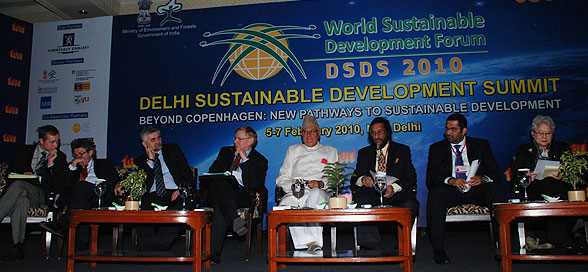
The session started with all the speakers expressing their solidarity with Dr R K Pachauri, and extending their support and admiration to IPCC, TERI and Dr Pachauri. The session then focused on ‘creating a new energy future’ wherein the role of renewable energy was highlighted. The panelists mentioned the ambitions targets being aimed for in their respective countries, emphasizing that urgency is needed in shifting to new energy sources.
For a developing country like India, the main challenges in promoting renewable energy are - access to long term finance at low interest rates, promotion of research and development, and building necessary human resources. Economic barriers and governance issues restrict the uptake of renewable energy and need to be addressed. It was noted that renewable sources of energy remain fragmented and favorable policies don’t exist.
It was emphasized that a single technology cannot solve the problem; there is a need to understand that energy markets are changing in which to ensure seamless transition to cleaner fuels there will be role for nuclear energy and natural gas also. Moreover, the transition to a clean technology society will not be led by any single country, but all the countries need to work together in developing practical technologies.
There is an opportunity to decouple economic growth from energy consumption; this can be achieved by changing the way we produce and use energy leading to less pollution and paving way for new leadership. This will also provide additional benefits in terms of promoting energy security, job creation and allow upscaling of projects. It was felt that Copenhagen was disappointing, but it must be seen in terms of its impetus in creating a new economic order that is more respectful of its economic resources, but the modalities remain to be worked out.







